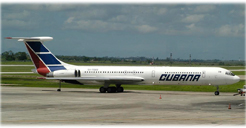Cuba Information
LANGUAGE of Cuba: Spanish. Very few people speak English.
Advice to enter in Cuba
A valid passport (at least six months after the date of return) is

required. In addition, all British citizens require a visa to enter Cuba. This must be obtained before traveling. You should contact the Embassy of Cuba in London for more information on entry requirements long before the date of your trip if possible.
Make sure you get the correct visa in accordance with the purpose of your visit. It is possible to enter Cuba on tourist visas, but there are other visa categories for different types of visitors.
For dual nationality should contact the Embassy of Cuba in London for advice on entry requirements before traveling.
Religions in Cuba:
The Cuban population is 99% Christian, mixed with Santeria, an African religion similar to voodoo.
Currency in Cuba:
The national currency is the Cuban Peso (CUP). Its value is fixed against the dollar, equal to 1 dollar for every Cuban Peso CUP. Only Visa and Master Card are accepted in Cuba. Also, travelers checks are generally accepted but not issued by American Express are accepted. There are no ATMs, so you have to withdraw cash in banks (Banco Financiero Internacional) or large hotels. Banks generally open from 8:00 to 15:00, Monday to Friday. The currency exchange desks at hotels are open from 9:00 to 20:00 and 21:00 daily.
Getting around Cuba
By air
There are flights to all major cities starting from Havana. The longest flight service is the Havana-Santiago who travels a distance of 620 miles. Foreign tourists pay in dollars the passages, and Cubans in Cuban pesos worth 20 times cheaper.
By train from Cuba:
Since 1997, there has been an exclusive service for tourists with luxury cars, incomparable to those used by the Cubans, which are old and uncomfortable.
By bus from Cuba:
The carrier, Viazul, has an extensive network throughout the island and has reduced prices for all tourists ($ 20 for example to travel from Havana to Cienfuegos), but the price is still beyond the reach of the Cubans.
By car from Cuba:
The roads are in pretty good condition and travel by car is not a problem. However, traffic signals are not always readable, but there’s a very nice Cuban at a crossroads that will guide foreigners gladly! Car rental in Cuba is very expensive ($ 65 per day minimum, plus insurance of $ 10 per day, making it useless in case of accident). Rented cars are targets for car thieves (tires, radios, side mirrors, etc.) A European driving license is enough to drive in Cuba. Driving a car in Cuba is dangerous and accidents are frequent so I always recommend that you drive carefully in Cuba.
Health Care in Cuba:
No vaccinations are required. Malaria treatment is not necessary. Avoid drinking tap water that has not been boiled. Also avoid the consumption of frozen since the rules of food hygiene are not always well controlled. Other than that, you can eat all the fruits and vegetables without problems.
There is a risk of gallbladder disease in Cuba. Symptoms include itching strong in the body (but not the face). You can get it from sleeping on old mattresses. Therefore, check the status of your bed, when going to stay in a hostel or a guest at someone’s house.
ELECTRICITY in Cuba:
Cuba is strangely both voltages of 110 V and 220 V, (sockets American and European), so it is essential not only to bring an adapter, but also a plug adapter to the American type.
NUMBER OF VISITORS OF CUBA:
In 2005, Cuba received 2,319,289 tourists.